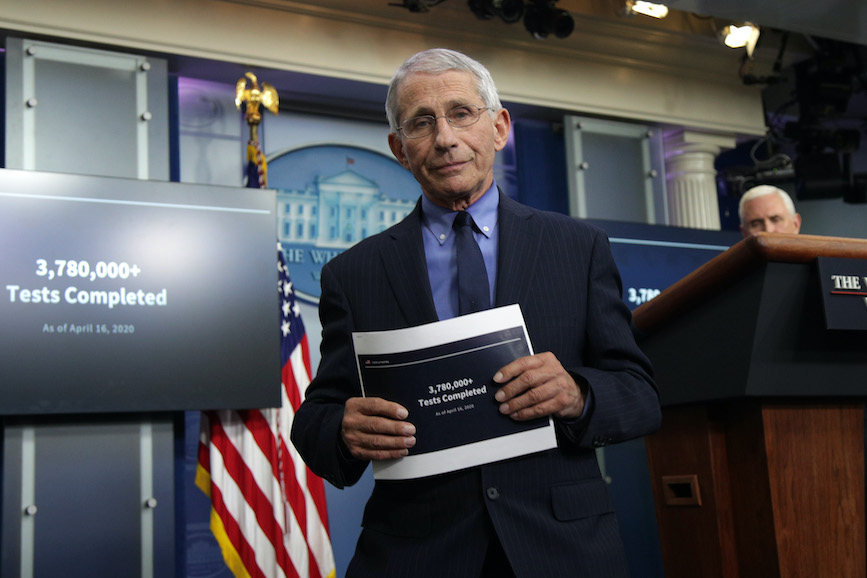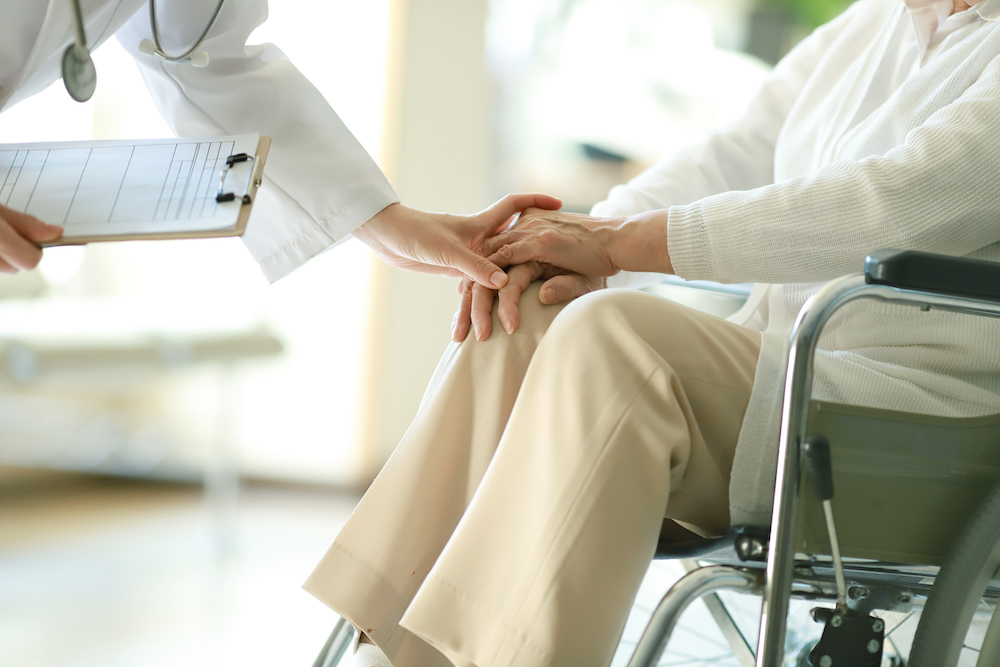Welcome back! In case you missed last week’s announcement, we shifted our publishing schedule for this newsletter to three days a week: Tuesday, Wednesday, and Thursday. We’re going to use our news-free Mondays and Fridays to work on anything and everything in-between — reading books, cooking meals and staring out the window watching the wind blow by.
Today’s Coronavirus Briefing is 1,241 words and will take you six minutes to read.
Top news
- According to the World Health Organization, nearly three million cases of coronavirus have been detected around the world.
- Chinese health officials claimed the city of Wuhan now has no coronavirus patients in its hospitals.
- In Spain, children under the age of 14 are now allowed outside one hour a day for the first time in six weeks.
- The U.S. has begun lifting lockdowns in a state-by-state, governor-centric fashion.
- The White House issued a “blueprint” strategy, developed with the Centers for Disease Control and Prevention and the Food and Drug Administration, for states to build their testing capacity. Retailers including Walmart and CVS will open hundreds of new testing sites.
- U.K. Prime Minister Boris Johnson returned to work yesterday, after falling sick with the virus and spending time in hospital in intensive care; he said it was too early to say when lockdowns would be relaxed.
The Takeaway:
Baby steps are being taken in some places; leaps in others.

Radical medical reform
Hindsight, as they say, is 20/20: Epidemiologists have long warned about an impending virus, yet here were are, scrambling to survive this thing medically, financially and psychologically. And there was one politician with a “radical” plan for weathering a dysfunctional medical maelstrom whose idea may surprisingly have its day in the sun.
- Medical Marketing & Media’s Marc Iskowitz takes a deep dive into how COVID-19 has exacerbated an already dysfunctional U.S. health insurance system. While some viewed Bernie Sanders’ Medicare for All idea “radical” during his bid for the U.S. presidency, a version of it may see the light of day when we’re on the flip side of the pandemic. The potential for some form of national insurance is quickly shifting from being a liberal agenda item to a realistic talking point for an increasing swath of the population.
- According to a survey by National Health Service England, four in 10 people are not seeking help from their general practitioner because they are afraid to burden the NHS during the pandemic, reports GP. Concerns that patients’ reluctance to come forward could put them at risk arises as leading charities warned the suspension of routine GP services could lead to a “future crisis.”
- And while some are reporting a loss in patients, Luke Haynes of GP takes a look at the 2,000 GPs in the U.K. currently absent from work — many of whom are assumed to be self-isolating. Low numbers of test facilities, a confusing appointment system, poor guidance and long journeys to access testing are a few of the reasons doctors are unable to quickly return to work. For those who do want to see their GP, this is making things more difficult.
- We’ve been following the clinical studies for remdesivir for weeks now, and latest reports show one trial may have results as early as mid-May; another, the data from which was accidentally released by the World Health Organization, suggested the drug provided no benefit at all.
The Takeaway:
We still don’t have a coronavirus cure. Go see your GP if you need to, virtually if possible.

Radical workplace behavior
Our new reality is becoming a new new reality as we begin returning to work, assessing the damage done and rearranging our seating charts.
- In the final part of Conference & Incentive Travel’s Impact of Coronavirus Report, Mark Williams reveals the terrible financial blow events and hospitality industries have suffered due to the outbreak of COVID-19.
- Caroline Dettman, a founding partner of Have Her Back Consulting, suggests it is time we stop following “tips” promoting working from home without interruption from cats and kids, and embrace our dual lives as caregivers and WFH-ers. In this reflective op-ed in PRWeek, Dettman posits that, in fact, caregiver bias and WFH bias are the very things that have been holding people back in the PR industry.
- Current government guidance in the U.K. states that, where it is not possible for staff to remain two meters apart, they should “work side by side, or facing away from each other, rather than face to face if possible.” But as Siobhan Palmer reports in People Management U.K., this isn’t sitting particularly well with workers, who have flooded a parliamentary committee with concerned emails.
- And in a bit of innovative, ecofriendly news, Kisco Senior Living, a California-based senior, independent and assisted living company, found a cost-effective and sustainable way to streamline the transition from dining room to room service using BPA-free and nontoxic microwave-safe food containers. Kimberly Bonvissuto reports in McKnight’s Senior Living.
The Takeaway:
Here’s hoping that all the positive changes we’ve made during this scourge won’t be forgotten the minute the curve has permanently flattened.

Radical communication
How to teach, heal and sell.
- Chris Daniels in PRWeek U.S. breaks down Dr. Anthony Fauci’s media relations strategy and finds a master of clear and calm communication.
- People Management U.K.’s Francis Churchill takes a look at how The Bank of Ireland, one of the Republic of Ireland’s largest commercial banks, is tackling the implications of COVID-19 logistically, financially and for the wellbeing of its staff.
- Brands and influencers looking to sell products to homebound customers are advised to proceed carefully, with messages of optimism and self-care mixed with varying levels of references to the pandemic.
The Takeaway:
There’s a reason a petition has circulated to nominate Dr. Fauci People magazine’s “sexiest man alive.”

Radical corrections
Nursing homes as the world’s new underdog, and the worst health advice ever.
- For anyone who thinks money has nothing to do with where personal protective equipment and test kits are going, James Berklan, executive editor of McKnight’s Long-Term Care News, is here to correct them. In a piece tinged with more than a little warranted frustration, he reminds readers that long-term healthcare workers, such as doctors and nurses, are on the frontline, or as Centers for Medicare & Medicaid Services Administrator Seema Verma said earlier this week, “ground zero.” Yet hospitals are getting the lion’s share of attention and funding while nursing homes are bearing the brunt of irrational blame.
- In yet a further blow to the long-term care industry, Lois Bowers of McKnight’s Senior Living reports on the Trump administration’s plan to exclude independent living, assisted living, memory care and continuing care retirement communities from an upcoming distribution of personal protective equipment.
- Neither hydroxychloroquine, chloroquine, nor disinfectants are effective for treating coronavirus. The Food and Drug Administration has issued a safety alert regarding the use of hydroxychloroquine and chloroquine, either alone or in combination with azithromycin, for treating the disease. PRWeek U.S. reported that RB, the makers of Lysol and Dettol, released a statement saying: “As a global leader in health and hygiene products, we must be clear that under no circumstance should our disinfectant products be administered into the human body (through injection, ingestion or any other route).”
The Takeaway:
Like Nancy Reagan once stressed: Just say no.
Videos + poem
Aligned with today’s theme, here are some radical music videos, or maybe not so radical, but radically uplifting. Also, a poem.
- Lizzo, “Phone”
- Mark Ronson & The Business Intl., “Bang Bang Bang”
- Weezer, “Buddy Holly”
- Alison C. Rollins, “Free Radical”
See you Wednesday.







